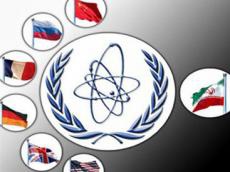|
|
TODAY.AZ / World news
Iran says nuclear talks 'could be different' if world powers show goodwill
21 February 2013 [15:50] - TODAY.AZ
 By Azernews
By AzernewsIranian Deputy Foreign Minister Seyyed Abbas Araghchi said Tuesday that the upcoming talks between the P5+1 group of world powers and Iran could be different from previous negotiations if the other side proves its goodwill and sincere intentions, according to IRNA news agency.
"We have to wait and see what approach the other side takes in the upcoming talks," he said.
Iran and the P5+1 group -- Britain, China, France, Russia, the United States, and Germany -- have agreed to hold the next round of talks with a focus on Iran's nuclear energy program in Almaty, Kazakhstan on February 26.
Also, Iran's Foreign Ministry spokesman Ramin Mehmanparast said recently that the P5+1 group has not yet provided Iran with its proposals regarding Iran's nuclear program.
"During the nuclear meeting in Kazakhstan they might propose something to Iran, however officially we have not received any proposals," Mehmanparast said.
Mehmanparast said the world powers offered Iran to shut down the Fordo plant, to stop the uranium enrichment, in turn allowing the country to carry out gold transactions.
"They want to take away the rights of a nation in exchange for allowing trade in gold," Mehmanparast said, adding that the offer was unacceptable.
The Foreign Ministry spokesman said that the P5+1 group that the Iranian side holds negotiations with has to accept the nation's nuclear rights.
"If our rights are accepted and recognized, then all possible consequences would be eliminated," he said, adding that striking a common ground would help the sides to resolve the issue.
In 2012, representatives of the P5+1 group and Iran held three rounds of talks -- in Istanbul on April 14, in Baghdad on May 23-24 and Moscow on June 18-19. None of these meetings resulted in breakthroughs on disputed nuclear issues.
Previously talks between the six powers and Iran were not conducted for over a year.
The United States, Israel, and some of their allies have repeatedly accused Iran of pursuing non-civilian objectives in its nuclear energy program. Iran rejects the allegations, arguing that as a committed signatory to the nuclear Non-Proliferation Treaty (NPT) and a member of the International Atomic Energy Agency (IAEA), it has the right to use nuclear technology for peaceful purposes.
URL: http://www.today.az/news/regions/119394.html
 Print version
Print version
Views: 1291
Connect with us. Get latest news and updates.
See Also
- 23 August 2025 [21:50]
Marmara region records driest July in 65 years - 23 August 2025 [21:20]
TikTok to cut hundreds of jobs in UK amid AI moderation shift - 23 August 2025 [20:15]
Iran, European powers agree to resume talks next week - 23 August 2025 [19:40]
Seoul says fired warning shots after North Korean troops crossed border - 23 August 2025 [18:35]
World Bank approves Istanbul’s efforts to tackle natural hazards - 23 August 2025 [18:05]
EU delivers over €4 billion to Ukraine ahead of its Independence Day - 23 August 2025 [09:00]
US and S Korean FMs coordinate ahead of Trump–Lee Summit - 23 August 2025 [08:00]
Nvidia halts production of China-specific AI chips amid regulatory pressure - 22 August 2025 [23:31]
Elon Musk invited Mark Zuckerberg to join $97 bln bid for OpenAI, court filing reveals - 22 August 2025 [22:23]
TikTok to cut hundreds of moderation jobs in London amid regulatory shifts
Most Popular
 Pope Leo XIV plans 1st overseas visit to Lebanon, possible stop in Turkiye
Pope Leo XIV plans 1st overseas visit to Lebanon, possible stop in Turkiye
 China says it’s willing to support political resolution in Ukraine, responds to Zelensky’s remarks
China says it’s willing to support political resolution in Ukraine, responds to Zelensky’s remarks
 Moscow tests Washington by striking US interests in Ukraine after peace talks
Moscow tests Washington by striking US interests in Ukraine after peace talks
 TikTok to cut hundreds of moderation jobs in London amid regulatory shifts
TikTok to cut hundreds of moderation jobs in London amid regulatory shifts
 US plans to raise import tariffs on Indian goods over Russian oil purchases
US plans to raise import tariffs on Indian goods over Russian oil purchases
 Elon Musk invited Mark Zuckerberg to join $97 bln bid for OpenAI, court filing reveals
Elon Musk invited Mark Zuckerberg to join $97 bln bid for OpenAI, court filing reveals
 Caspian neighbors unite: President Aliyev’s visit marks stronger ties
Caspian neighbors unite: President Aliyev’s visit marks stronger ties
